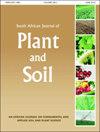田间条件下班巴拉花生品系农业形态多样性评价
IF 0.7
Q3 AGRONOMY
引用次数: 0
摘要
评估农业形态变异对栽培品种的作物改良策略具有重要意义。班巴拉花生(Vigna subterrea)Verdc.)是一种被忽视的作物,需要广泛的农业形态特征来设计合适的农艺和作物改良策略。2017年和2018年在两个地点对19个班巴拉花生品系的农业形态性状进行了评价。实验被布置成分裂-分裂图,完全随机设计,有三个重复。除叶绿素含量和气孔导度外,各品系间差异均显著(p < 0.05)。如果观察到的基因型差异以重组的遗传差异为基础,将有助于班巴拉花生的改良。主成分1和主成分2占变异的52.31%,表明单靠农业形态性状不能充分区分班巴拉花生品系。最有用的性状是根冠质量、株高和叶数。苗期紧急度与叶绿素之间的负相关和不利相关关系将使班巴拉花生改良过程中这些性状的同时选择复杂化。但遗传差异指数表明种质内存在遗传变异,这对班巴拉花生改良具有重要意义。由于肯尼亚顶点系、Uniswa-Red-G系、Uniswa-Red-R系和KANO2系在几个关键性状上表现优异,因此被选作育种和推荐用于生产。本文章由计算机程序翻译,如有差异,请以英文原文为准。
Agro-morphological diversity of Bambara groundnut lines evaluated under field conditions
Assessing agro-morphological variation is important for crop improvement strategies in cultivated species. Bambara groundnut (Vigna subterranea (L.) Verdc.) is a neglected crop that requires extensive agro-morphological characterisation to design suitable agronomic and crop improvement strategies. Nineteen Bambara groundnut lines were evaluated at two sites for agro-morphological traits in 2017 and 2018. The experiments were laid out as a split-split plot completely randomised design with three replications. The lines showed significant differences (p < 0.05) for all the traits except chlorophyll content and stomatal conductance. The observed genotypic differences would be useful for Bambara groundnut improvement if they are underpinned by genetic differences for recombination. Principal components 1 and 2 accounted for 52.31% of the variation showing that agro-morphological traits alone could not adequately discriminate between the Bambara groundnut lines. The most useful traits were root and shoot mass, plant height and leaf number. The negative and unfavourable correlations between seedling emergency and chlorophyll would complicate simultaneous selection for these traits during Bambara groundnut improvement. However, genetic dissimilarity indices indicated that there was genetic variation within the germplasm, which is important for Bambara groundnut improvement. Lines Kenya Capstone, Uniswa-Red-G, Uniswa-Red-R and KANO2 were selected for breeding and recommended for production due to their high performance in several key traits.
求助全文
通过发布文献求助,成功后即可免费获取论文全文。
去求助
来源期刊

South African Journal of Plant and Soil
Agricultural and Biological Sciences-Plant Science
CiteScore
1.90
自引率
11.10%
发文量
32
期刊介绍:
The Journal has a proud history of publishing quality papers in the fields of applied plant and soil sciences and has, since its inception, recorded a vast body of scientific information with particular reference to South Africa.
 求助内容:
求助内容: 应助结果提醒方式:
应助结果提醒方式:


